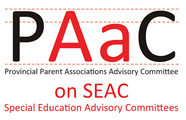Research and knowledge about special education, and information about effective intervention, teaching and assessment strategies, is constantly evolving. This means that school boards should be continuously reviewing their special education programs and services to make sure they are evidence-based, meeting student needs and improving student achievement.
Effective Practices to support SEAC participation in planning of special education programs and services include:
- Providing SEAC members with a brief outline of the school board’s special education programs and services in the SEAC manual and at orientation and training sessions.
- Planning regular presentations to SEAC about special education programs and services, the needs of exceptional students, and the latest research on effective interventions.
- Allowing time on each SEAC agenda for a short presentation, or discussion, on specific exceptionalities or special education programs and services.
- Encouraging feedback on presentations from all SEAC members by providing discussion questions as part of the presentations and providing time for pair and share, or small group discussions.
- Inviting SEAC members to participate in working groups and sub-committees involved in program reviews, or new initiatives.
- Inviting SEAC members who are local association representatives to make annual presentations on the parent association, exceptionality specific educational needs, and the latest research on effective interventions.
- Inviting local association representatives to make presentations, or work with school board staff on joint presentations, regarding specific exceptionalities or special education programs and services.
- Promoting connections between SEAC, Parent Involvement Committees (PIC) and school councils to share information, and invite consultation, about special education programs and services.
SEAC has an important role to play in providing advice to school board administration and Trustees regarding special education programs and services. SEAC members can provide important community input about the impact of programs and availability of services. Some school boards have a regular cycle for reviewing special education programs, and other school boards review or plan changes in response to Ministry of Education initiatives, or funding challenges. PAAC on SEAC recommends that SEAC take a systematic and pro-active approach to special education program and service planning, and conduct regular reviews.
